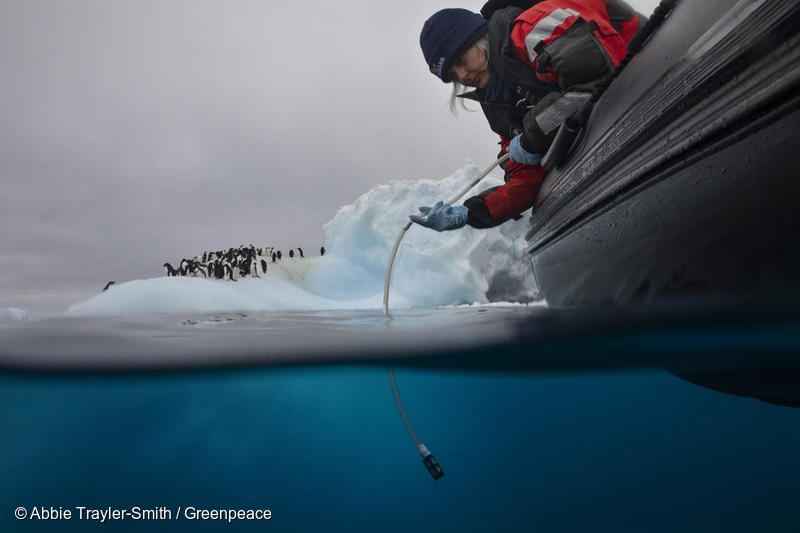Science is a means of trying to understand the world, and what it can teach us is always evolving.
People are sometimes surprised when they realize how often the Greenpeace global network collaborates with scientists, but it is fundamental to our work. Our whole purpose is to fight for solutions that are essential to a green and peaceful future. Working with scientists and acting in accordance with the best available science is how we know we are prioritizing the right issues and promoting the right solutions.

Dr Kirsten Thompson, lead scientist on the Arctic Sunrise takes water samples for eDNA sampling near Paulet Island in the entrance of the Weddell Sea, Antarctica.
Occasionally, we learn something new that makes us realize we are better off than we thought; more often, the opposite is true. That’s why the precautionary principle is at the heart of Greenpeace’s approach. The less we know about the impacts of doing something, the more careful we should be. That means not allowing untested chemicals to be used in food packaging, for example, or launching a whole new industry to mine the deep sea when we have very little knowledge of what that will mean for the climate or the health of our oceans.
Greenpeace International has a very good Science Unit, which advises us on our work and helps ensure our accuracy and preserve our credibility. In addition, we partner with independent scientists from institutions all over the world. Whether we are trying to assess the impact of an oil spill, document an offshore area Shell wants to drill, or evaluate how fast Arctic sea ice is melting, scientists play a critical role in our work.

Oceans Campaigner and coral Expert Sandra Schoettner from Germany is onboard the Esperanza shortly before a trip with a two-man submarine to explore the newly discovered coral world in the Brazilian state of Amapá. New images and footage of the Amazon Reef are being produced with use of the submarines.
In early 2017, several oil companies were gearing up to drill on the newly discovered Amazon Reef. The reef, stretching hundreds of miles, was far offshore, in an area below the plume of the Amazon River prone to poor visibility and unpredictable currents. Even the scientists who had mapped the reef had never actually seen it. We brought them out on the Greenpeace ship Arctic Sunrise, and we took them down in a small submarine to survey the reef with high-definition video cameras. What we found together led to new scientific discoveries. It also put the Amazon Reef on the front pages of newspapers in Brazil and all over the world, and the combination of scientific data and public outcry forced the oil companies to give up on their drilling plans.
Scientists have also helped demonstrate that human health and environmental health are closely linked. Toxic chemical additives commonly used in plastic packaging, such as PFAS, bisphenols, or phthalates are not just dangerous for marine life; they can cause cancer, birth defects, or other serious problems. Partnering with scientists helps us protect people as well as the planet. The world’s richest men may try to convince us their rocket joyrides can lead to new settlements on distant worlds, but the fact remains: for the nearly eight billion people alive today, our future depends on healthy oceans, and a healthy planet.

Antarctic biologist Dr. Susanne Lockhart examines a bryozoan under the microscope, collected from a submarine dive in Gerlache Strait, the Antarctic. Bryozoans are colonial organisms that produce a hard skeleton in a similar way that tropical corals do
Given where we are today, ecosystems degraded from deforestation, pollution, and industrial fishing, on the brink of runaway climate change that could make our planet largely unlivable—it is more important than ever to keep a close watch on how our planet is changing and adapting. We don’t have time for false solutions or half measures. Nor can we afford to add new stresses to ecosystems already pushed to the breaking point.

DOER Supervisor Rudy Schlepp writes in the dive log of the Dual Deep Worker submarine on an inflatable boat near the Greenpeace ship MY Arctic Sunrise in the Gulf of Mexico. A team of independent scientists joined the crew of the Arctic Sunrise to conduct a series of scientific research programs that will further the understanding of the impacts of both oil and chemical dispersant on the Gulf ecosystem in the aftermath of the British Petroleum oil spill.
Scientists have a long history of helping identify problems, such as the hole in the ozone layer, or the toxic impacts of DDT or asbestos. Collaboration with scientists provides us with an early warning system that can enable us to prevent or stop the damage from occurring. Independent campaigning organizations like the Greenpeace global network are poised to amplify these warnings and turn them into policy solutions.
—
This essay is part of our Perspectives: Our Next Fifty Years series, in which we reflect briefly on our first fifty years, but more importantly, we lay out the future we are building together—collaborative, ambitious, and intersectional. The work ahead won’t be easy, but we’ve never shied away from hard work. We continue to push for policies that recognize the contributions and leadership of marginalized groups, and we amplify their voices, looking to their wisdom to show us the way. We hold corporations accountable, demanding real action that puts people ahead of profit. We work each day with our partners to co-create green, safe planet for all beings. We recognize that equality is not necessarily justice. We demand more from our leaders, from our colleagues, and from ourselves. A green and peaceful world isn’t just a slogan—it is our mission, and it takes each one of us to get there.





